Reply To:
Name - Reply Comment
Last Updated : 2024-04-19 06:03:00
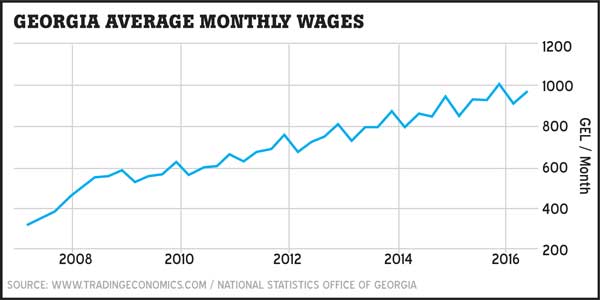
Georgia, a former Soviet state, has lessons for Sri Lanka on political will and economic reform.
If Georgia was a book, then it is surely is one of many pages. Her pages would be full of Caucasus Mountain villages and places like Vardzia, a cave monastery dating back to the 12th century, and the Black Sea beaches. What is in it for us as a nation lies a few pages after: the visionary political and economic reforms done in Georgia during 2004 and 2012.
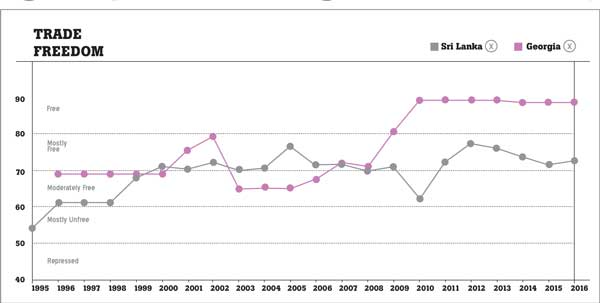
Being a country at the intersection of Asia and Europe with a 4.4 million population, Georgia offers many lessons to Sri Lanka, where politicians struggle to drive the country forward after nearly seven decades of independence.
 With the fall of the Soviet Union in 1991, the Republic of Georgia had a long walk through darkness until it finally saw the light at the end of the tunnel in 2004. In the 1990s, Georgia was torn apart by a civil war. The country was taken over by corrupt interests. In 2003 however, Georgians fought back. Peaceful protests after a disputed election saw the ouster of President Eduard Shevardnadze and the end of Soviet-backed rule. In the climatic end of the saga, demonstrators stormed a session in parliament with red roses in hand. Georgians remember this as the ‘Rose Revolution’. In the following presidential and parliamentary elections, reformist leader Mikheil Saakashvili came into power kick starting what many analysts consider a small economic miracle in Georgia.
With the fall of the Soviet Union in 1991, the Republic of Georgia had a long walk through darkness until it finally saw the light at the end of the tunnel in 2004. In the 1990s, Georgia was torn apart by a civil war. The country was taken over by corrupt interests. In 2003 however, Georgians fought back. Peaceful protests after a disputed election saw the ouster of President Eduard Shevardnadze and the end of Soviet-backed rule. In the climatic end of the saga, demonstrators stormed a session in parliament with red roses in hand. Georgians remember this as the ‘Rose Revolution’. In the following presidential and parliamentary elections, reformist leader Mikheil Saakashvili came into power kick starting what many analysts consider a small economic miracle in Georgia.

The story has many parallels to Sri Lanka. Today, we have ended our own military conflict of 30 years, yet the future still seems fractured. Hopes for rapid economic reforms to take Sri Lanka to the next level have quickly evaporated. Instead, the government seems to be embroiled in one political crisis after the other. Unlike the Georgian politicians, instead of seizing the momentum of Sri Lanka’s own political revolution, the Sri Lankan leaders could end up squandering the reform movement.
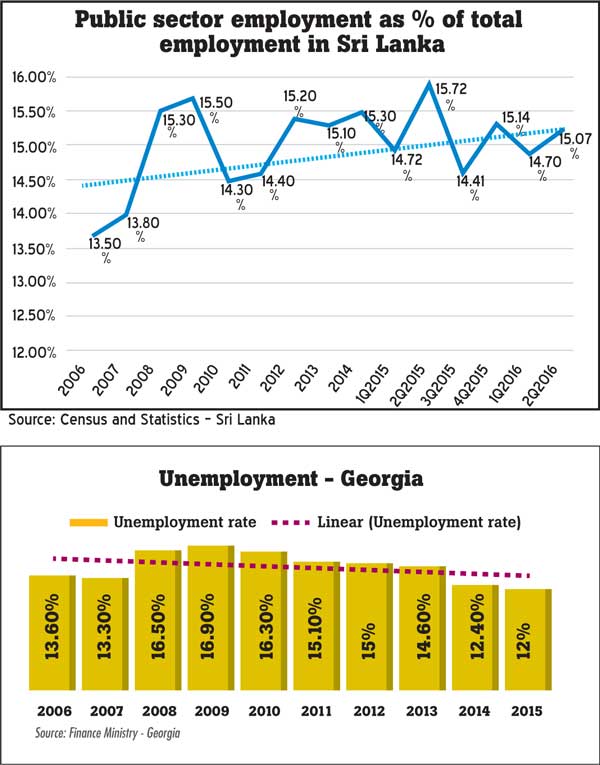
Most economists agree that greater economic freedom has a strong correlation with greater prosperity of a country. Table 1 shows a simple comparison how Georgia, which came to be born a mere 25 years ago, overtook Sri Lanka in such a short span of time.
The Heritage Foundation is one organisation that measures the level of economic freedom in a country. The comparison is telling: (See Table 1)
As per the index of economic freedom by Heritage Foundation, the way Georgia has progressed is clear. It is not rocket science. We need the necessary reforms for business freedom, trade freedom and investment freedom.
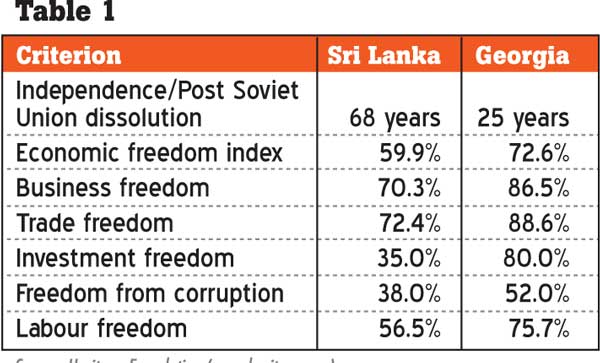
How Georgia did it
Contrary to popular belief, we must come to understand that most politicians in the world have little intention to make a country or its people genuinely prosperous. Governments are distracted and politicians have a short-term single-minded goal -- the next election. Even those who come into politics with good intentions eventually succumb to the temptation to look after themselves, their future generations and ensure their supporters have a big enough slice of the cake. They have centralized power, racked up the country’s debt and siphoned off benefits for themselves. This is the experience of our post-independence democracy.
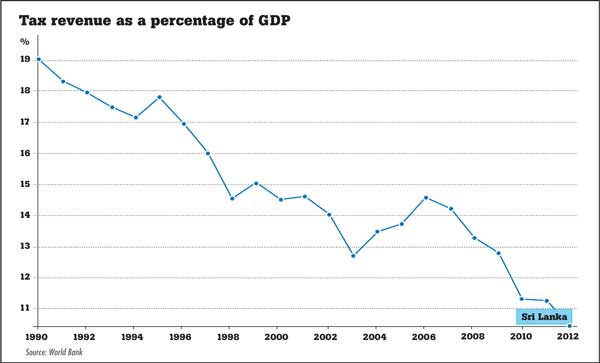
Changing political incentives is not easy but Georgia offers a great example. After the Rose Revolution, instead of expanding the power of the state, they limited its power. This provided more freedom and responsibility for their people to make their own lives better as citizens.
By 2003, Georgia was drowning deep in corruption, sliding fast down a slippery slope when the Rose Revolution took place.
Rose Revolution leader Mikheil Saakashvili became President in 2004. He was re-elected in 2008 and in the eight-year tenure of Saakshvili, his reform agenda changed the course of progress of Georgia.
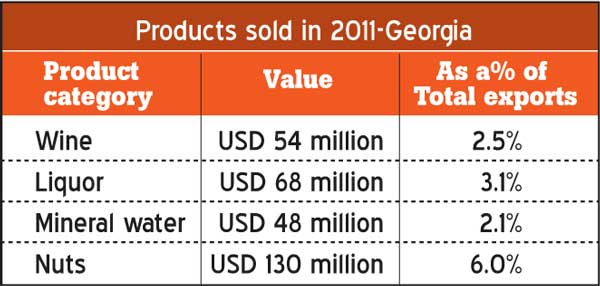
Tax reduction
These are some of the actions taken: simplified and reduced the number of taxes applicable to six from 20 taxes; reduced the rates of taxation. (Income, value-added tax (VAT), corporate, excise, customs and property tax were the only taxes applicable. All the other taxes were abolished).
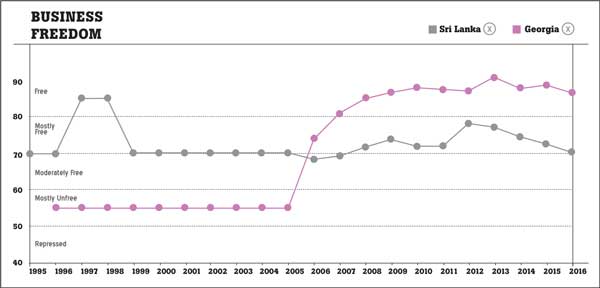
Significant reductions were made in tax rates across the board: for income taxes, VAT, profits and customs duties. A new system was introduced to pay taxes online and many tax clauses were brought in to eradicate widespread tax avoidance and evasion by companies. The ultimate outcome was that tax income collection increased sixfold within six years despite the reduction in rates.
The unfortunate truth in Sri Lanka is that the few income taxpayers who contribute to the economy are being penalized by the Inland Revenue and the government tries to regulate their industries on top of that. The result speaks for itself as for the bad policy of the government does prove they are not capable of re-correction to this rudderless course. In comparison, our tax revenue is going down relative to gross domestic product (GDP) every year and this is all due to the mediocre tax structure we have in Sri Lanka.
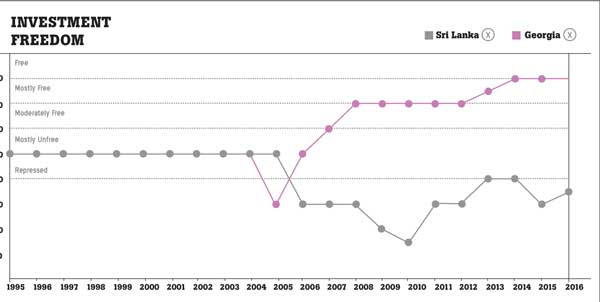
Reduce size and footprint of state
The number of government agencies was reduced along with the number of government employees. The salary scales of the remaining employees on the state payroll were increased, which led to productivity improvements in the government sector.
The police force was totally reformed, which carries important lessons for Sri Lanka. Trust in the police increased from zero to 80 percent. Under the previous system, the police conspired with criminals and corruption had overtaken the system. What the Georgians simply did was cutting down the cadre and increasing the salary of the remaining staff.
Cutting down heavy-handed regulations
Eight hundred permits and licences were abolished and state and land properties, such as sea ports and airports, were privatized. New regulations introduced to hire and fire employees easily resulted in lower rates of unemployment and higher pay in Georgia.
In Sri Lanka, our government sector keeps expanding and everyone gets disappointed as no one gets paid as per their expectations. Our productivity goes down and unfortunately, the entire government sector has become a slave house of politicians regardless of the colour of the flags they hold.
Our education system continues to teach us to dream small and aim for stability than going for growth and stand on our feet. So we have become a nation of complacent people with colourless and meaningless criticisms.
Adopting international standards to remove layers of regulation. In Georgia, the Organisation for Economic Cooperation and Development’s (OECD) standards for pharmaceuticals, food, consumer products and services were fully adopted and welcomed. No special permits were required for the OECD-approved goods and services to enter Georgia. The banks also welcomed this decision, as it made their operations easier.
Anyone who had a Schengen visa or a tourist from a country, which had a GDP per capita twice that of Georgia’s, could freely enter Georgia.
Industrial development and liberalization
The prices were liberalized in the power sector and power production and distributions were privatized. Priority was given to foreign direct investment. Private hydropower plants were constructed and fast-flowing rivers from high mountains created electricity, which was exported to almost twice the quantum that was imported before.
The export sector was totally revamped. This needed to be done as Russia banned the Georgian imports in 2006. The country improved all the products to compete in the international market. Wines, fruit, mineral water and such became high-quality exports through internal competition among traders. Within four years, Georgia’s export revenue exceeded to of what it was before the Russian imports ban.
While Sri Lankan politicians exhausted their voters by providing excuses for the GSP Plus and the ban on fish imports by the European Union (EU) and many other superficial reasons, Georgia had the courage to open up its markets and start small.
Economic Liberty Act
To ensure the sustainability of the economic growth, the Georgian parliament passed the Economic Liberty Act. The law restricted creation of new taxes and required the government to maintain the government debt at 60 percent of GDP, government expenditure to be 30 percent of GDP and budget deficit not to exceed 3 percent of GDP. During the tenure of Saakashvili, the GDP per capita increased by 300 percent to reach US $ 3300.
Sri Lanka has a Fiscal Responsibility Act, which could be strengthened by the inclusion of provisions similar to that of Georgia. The need is clear: just to compare the figures of Sri Lanka Forbes reported on September 30, that the Sri Lankan government’s debt to GDP stands for 75 percent and 94 percent of all government revenue is currently directed to debt repayment. The budget deficit is at 6.1 percent as per GDP in the first quarter of 2016.
Georgia after 2012
In 2012, an opposition coalition, which was founded just six months before the election, defeated Saakashvili’s party and Bidzina Ivanishvili, the wealthiest man in Georgia, became Prime Minister.
Two weeks prior to the election, a video showing violence against prisoners was aired on an opposition-run television channel. It was the cause of public outcry that resulted in strong opposition votes.
In 2014, Georgia established a free trade agreement with the EU. Following its intent to become an EU member state, Georgia had been introducing European standards to many of its industries.
With a more populist political party at the helm, Georgia’s economy grew by 3.4 percent in 2013, 4.6 percent in 2014 and 2.8 percent in 2015. The inflation rate reached 4.9 percent in 2015 and the value of the Georgian lari declined by 30 percent.
As of 2016, Georgia’s external debt has reached US $ 15 billion, six billion of which is government debt. The debt is equal to 43.3 percent of GDP. Since 2012, Georgia has been borrowing US $ 220 million every year from the World Bank. It borrowed US $ 290 million in 2016. As a result, its budget deficit has reached 11 percent of GDP. The most rapidly growing industry in its economy is tourism. Georgia’s tourism industry is now accountable for 23.5 percent of GDP, 20 percent of employment and 36 percent of its exports.
The lesson learnt from where Georgia heading after 2012 is that economic reform is an ongoing process. It is said ‘success fails like nothing’ and surely economic reforms are not a once and for all solution. Once a country is taken to a certain level through necessary economic reforms, it needs to continue progressing with the global economic trends and the expectations of the people of the country. From Sri Lanka’s point of view, we haven’t made any major reforms in our economy. Before we move on to the sustenance phase, we need to pass the start up phase.
Lessons for Sri Lanka and way forward
To overcome the current crisis, Sri Lanka has many things to do but if we try to do all of them, it would be next to impossible. It was said by Mathma Ghandhi, “Actions express priorities.”
A proper economic plan
First, a proper economic plan needs to be tabled by the government for the remaining years of this parliamentary term clearly mentioning the short-term reforms and the reforms need to be implemented within the next generation. So the president and prime minister will be more focused rather than appearing as comedians in front of the public bringing up ad hoc policy recommendations and making purely unnecessary statements, where the public feel they need to punish themselves from toxic stingray tails for wasting time in polling booths.
Simplified tax system
A new system of simplified taxation needs to be introduced. Importantly, the system has to be a simple tax system that provides convenience. Rather than increasing the tax rates, it is vitally important to broaden the tax base and make the collection efficient, so that the increasing tax income will not be a mammoth task as it is now.
Liberalize trade and foreign investment
Rather than focusing on mega projects, which need to create new markets, the first step would be joining the global value chain in established industries. The business regulations need to be simplified and the number of approvals for a project needs to be cut down. In addition, unnecessary permits need to be abolished.
“Breathes there a man whose soul so dead, who never to himself has said, this is my country, my native land,” said Sir Walter Scott.
At Advocata, we stand for what we believe, and although many give up after losing the battle, we press on toward winning the war and fighting for genuine change to take mother Lanka to where she deserves to be.
We invite the so-called economic gurus and pundits who voted for allocating Rs.1180 million to upgrade their super luxury vehicles in the Cabinet to get up from just warming their seats and do something because this time it is not from the frying pan into the fire but from the frying pan into the microwave, where there is no point of return.
(Dhananath Fernando is Chief Operating Officer of Advocata Institute, an independent Sri Lankan think tank working hard for economic freedom.
He could be reached via dhananath@advocata.org)

Add comment
Comments will be edited (grammar, spelling and slang) and authorized at the discretion of Daily Mirror online. The website also has the right not to publish selected comments.
Reply To:
Name - Reply Comment
On March 26, a couple arriving from Thailand was arrested with 88 live animal
According to villagers from Naula-Moragolla out of 105 families 80 can afford
Is the situation in Sri Lanka so grim that locals harbour hope that they coul
A recent post on social media revealed that three purple-faced langurs near t

10 Apr 2024
09 Apr 2024